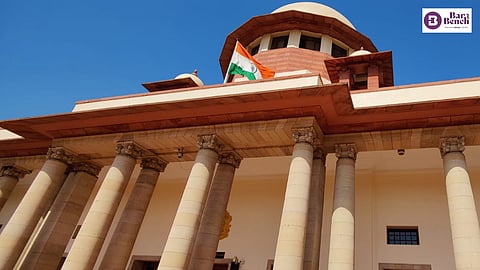
- News
- Columns
- Interviews
- Law Firms
- Apprentice Lawyer
- Legal Jobs
- हिंदी
- ಕನ್ನಡ

The Supreme Court on Monday stressed that High Courts must be slow to interfere with rulings of Settlement Commissions, as such interference could lead to a multiplicity of proceedings. [Kotak Mahindra Bank Limited vs Commissioner of Income Tax Bangalore and anr]
Settlement Commissions are alternate dispute resolution mechanisms under Indian income tax and excise laws, for taxpayers seeking to resolve disputes over dues by means other than the traditional route of litigation.
A bench of Justices BV Nagarathna and Ujjal Bhuyan noted that frequent interference by courts in disputes before such commissions could erode the confidence of those who approach settlement commissions.
"Having regard to the legislative intent, frequent interference with the orders or proceedings of the Settlement Commission should be avoided ... The High Court should not scrutinize an order or proceeding of a Settlement Commission as an appellate court. Unsettling reasoned orders of the Settlement Commission may erode the confidence of the bonafide assessees, thereby leading to multiplicity of litigation where settlement is possible. This larger picture has to be borne in mind," the bench observed.
The Court made the observation while dealing with an appeal challenging Karnataka High Court judgments from 2012 and 2010, which had set aside a 2008 Settlement Commission order involving Kotak Mahindra Bank.
By way of background, in 2000, an Assessing Officer had alleged that the bank had been concealed its rental income. A Settlement Commission eventually pegged the additional income due from the bank at over ₹196 crores.
However, the forum waived the penalty amount and granted the bank immunity from prosecution under Section 245H(1) of the Income Tax Act.
This concession was given after the commission noted that the bank had co-operated in the proceedings with true and full disclosures.
The initial non-disclosure of the rental income was on account of existing Reserve Bank of India guidelines, the commission further found.
The High Court, however, set aside the said findings, leading to bank to move the Supreme Court in appeal.
The Supreme Court agreed with the commission's decision to grant the bank immunity from prosecution and to waive of the payment of penalty otherwise due from the bank.
"There is no straight jacket formula that would universally apply in every case. Where the Commission is satisfied that the applicant (a) has made full and true disclosure of his income and the manner in which such income was derived, and (b) has 34 co-operated with the Commission in the proceedings before it, immunity under Section 245H may be granted," the Supreme Court explained.
The top court added that the High Court should not have sat in appeal over the commission's decision or whether sufficient material was placed before the commission. These aspects are beyond judicial review, the Supreme Court said.
"We hold that sufficiency of the material and particulars placed before the Commission, based on which the Commission proceeded to grant immunity from prosecution and penalty as contemplated under Section 245H of the Act, are beyond the scope of judicial review," the Court's judgment stated.
The appeal was, thus allowed, and the orders of the High Court were set aside. The order of the Settlement Commission was restored.
Senior Advocate Shyam Divan appeared for Kotak Mahindra Bank. Additional Solicitor General Balbir Singh appeared for the Income Tax Department.
[Read judgment]